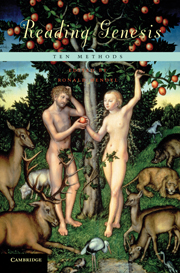Book contents
- Frontmatter
- Contents
- Contributors
- Acknowledgments
- Reading Genesis
- Introduction
- 1 Literature
- 2 Cultural Memory
- 3 Sources and Redaction
- 4 Gender and Sexuality
- 5 Inner-Biblical Interpretation
- 6 Rabbinic Interpretation
- 7 Interpretation in the Early Church
- 8 Translation
- 9 Modern Literature
- 10 Modern Theology
- Index of Biblical Citations
- General Index
6 - Rabbinic Interpretation
Published online by Cambridge University Press: 05 June 2012
- Frontmatter
- Contents
- Contributors
- Acknowledgments
- Reading Genesis
- Introduction
- 1 Literature
- 2 Cultural Memory
- 3 Sources and Redaction
- 4 Gender and Sexuality
- 5 Inner-Biblical Interpretation
- 6 Rabbinic Interpretation
- 7 Interpretation in the Early Church
- 8 Translation
- 9 Modern Literature
- 10 Modern Theology
- Index of Biblical Citations
- General Index
Summary
Midrash and its precursors
Rabbinic interpretations of Scripture – unlike the creation of the world (at least according to some ancient exegetes) – were not a creation ex nihilo. They were preceded by a long and varied chain of tradition that, in turn, was adapted by the rabbis to suit their own cultural needs. To fully appreciate the rabbinic exegetical enterprise, we must pay attention to the legacy (at times hidden) that informed their practice and, at the same time, recognize the astonishing novelty of their project. The novelty lies not only in the thematic plan but also, as I argue, predominantly in the formal–rhetorical aspect of their writings. That is, what we see in rabbinic interpretation of Scripture is a new epistemology, one that situates the text itself as an explicit locus of knowledge. This epistemological shift is implicated in the self-reflexive character of rabbinic texts themselves, which in turn render the characters they embody – whether they are the projected biblical protagonists or the implied rabbinic subjects – self-reflective. Before addressing this epistemological shift, we must first turn to the beginning.
The book of Genesis begins with a seemingly simple, although grammatically awkward, statement: “In the beginning God created heaven and earth.” Yet, already in Scripture itself we find that imagining the very moment of creation did not end (nor did it begin) in Genesis 1. When Wisdom, the speaker in Proverbs 8, announces, “The Lord made me the beginning of his course, the first of his acts of old” (8:22), it inscribes itself as a transformative force in the primordial moment. Here and elsewhere, the first traces of the retelling of the Genesis story are to be found within the Bible. Whether imagined in the conceptual framework of Sophia-Ḥokmah (as in Proverbs), or as God's battle with mythological beasts (as in Psalms or Job), or in the creation language of the building of the tabernacle (as in Exodus), these texts tell a different story than the one told in the opening chapter of the canon. Not only do mythological beasts – conspicuously absent from the Genesis Creation narrative (albeit etymologically alluded to in the name Tehom/Tiamat) – resurface in other texts, but also the universalistic paradigm that the Genesis story outlines is later linked to a particularistic trajectory concerning Israel and its redemption from Egypt. Competing or reworked traditions, and even exegesis of Genesis narratives, are contained within Scripture itself, attesting to the different schools and the long process that informed its formation until it reached the final stage of canonization sometime in the first century C.E.
- Type
- Chapter
- Information
- Reading GenesisTen Methods, pp. 119 - 135Publisher: Cambridge University PressPrint publication year: 2010
- 2
- Cited by



